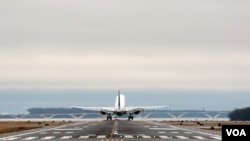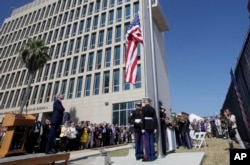The United States and Cuba signed a deal Tuesday that allows U.S. commercial airlines to make up to 110 daily flights to the communist island, the most significant new business link between the two countries since the end of their five-decade Cold War-era hostilities.
U.S. transportation chief Anthony Foxx and his Cuban counterpart, Adel Yzquierdo Rodriguez, agreed to the pact at a ceremony in Havana. It calls for 20 flights a day to the Cuban capital, in addition to the current 10 to 15 charter flights.
The remainder of the new flights, which could start later this year, would carry travelers to nine other Cuban cities, where there is far less demand than for flights to Havana.
"Today is a historic day in the relationship between Cuba and the U.S.," Foxx said. "It represents a critically important milestone in the U.S. effort to engage with Cuba."
Several U.S. carriers say they plan to add flights to Cuba as soon as details on flight routes can be worked out, but Cuban carriers will still have to obtain their own licenses from U.S. authorities.
U.S. President Barack Obama and Cuban President Raul Castro restored diplomatic ties between the two countries in late 2014. They subsequently opened embassies in Havana and Washington and now are moving to improve business links, even as a U.S. trade embargo remains in place.
Under the airline agreement, U.S. visitors would still have to meet one of the 12 qualifying reasons to go to Cuba, such as traveling as part of an educational tour or arranging a professional meeting. But the distinction between banned tourism and travel for other reasons has blurred significantly.
Regular commercial flights between the U.S. and Cuba ended 53 years ago, but in recent years charter flights have accommodated a growing number of American visitors.
Last year, about 160,000 Americans made the short trip to Cuba, located 145 kilometers off the southeastern U.S. state of Florida, home to thousands of Cuban-born immigrants and their families who left their homeland after revolutionary Fidel Castro seized control in 1959. Castro subsequently nationalized millions of dollars worth of U.S. corporate and private property in Cuba.
The airline deal comes a day after the U.S. approved the construction of the first American factory on the island since the restoration of diplomatic relations, a farm tractor assembly operation that plans to hire Cuban workers.





